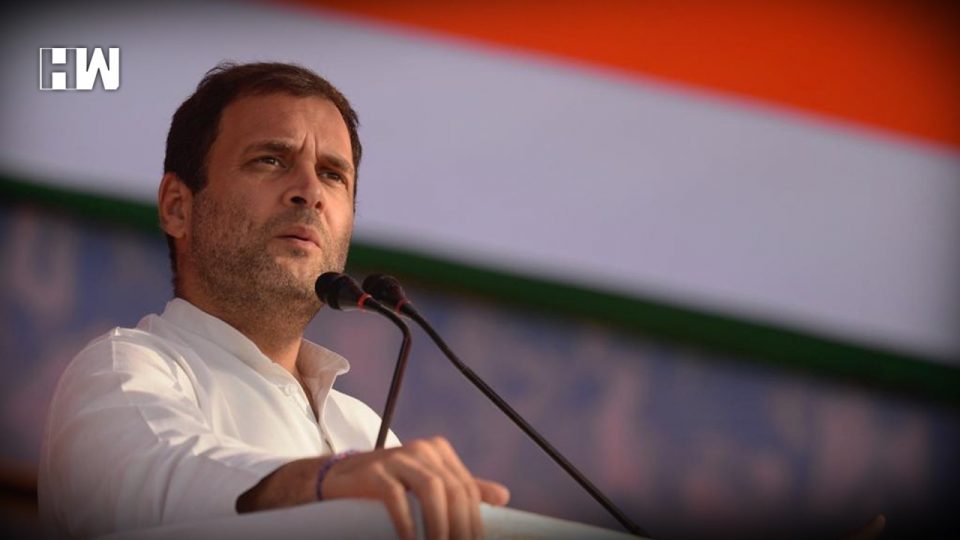As the entire hullabaloo surrounding “Pliable” continues, a quick search on Google will tell you what the word means.
Many of our journalists on ever-buzzing Indian Twitter are outraging over the word “Pliable”. For those who are completely unaware of how this fairly innocuous-seeming word offended many of my colleagues, let me give you a brief background.
It was on Thursday that Congress President Rahul Gandhi during a press conference sought to take a swipe at Prime Minister Modi’s interview with ANI editor Smita Prakash as being “staged” and lampooning the interviewer as “Pliable”. His remarks were followed by a prompt rebuttal by the ANI chief calling it a “Cheap Shot” and “downright absurd”. “Not expected of a president of the oldest political party in the country,” she tweeted. Many journalists and even politicians (read BJP leaders) came out in her support and slammed Rahul Gandhi for his comments.
Dear Mr Rahul Gandhi, cheap shot at your press conference to attack me. I was asking questions not answering. You want to attack Mr Modi, go ahead but downright absurd to ridicule me. Not expected of a president of the oldest political party in the country.
— Smita Prakash (@smitaprakash) January 2, 2019
“The Grandson of the ‘Emergency dictator’ displays his real DNA – attacks and intimidates an independent Editor,” tweeted Finance Minister Arun Jaitley. Adding a question on the silence of “pseudo-liberals” (Wait. The Irony just died). On the other hand, many others disagreed and saw nothing wrong with Rahul Gandhi’s comment. As the debate around “Pliable” heated, the IT cells of both parties aided their respective sides by releasing interview videos of Modi, Rahul Gandhi and Sonia Gandhi- which is supposed to be a commentary on how certain journalists suck up to the rival parties and what “Pliable” journalism looks like.
The Grandson of the ‘Emergency dictator’ displays his real DNA – attacks and intimidates an independent Editor.
— Arun Jaitley (@arunjaitley) January 3, 2019
#Pliable isn't offensive, it's the state of Indian journalism today pic.twitter.com/xCKq2jdCaS
— Congress (@INCIndia) January 3, 2019
Dear Rahul Gandhi, Let me show you what ‘pliable’ means… Enjoy! pic.twitter.com/9LlBsMBbvS
— Amit Malviya (@amitmalviya) January 3, 2019
As the entire hullabaloo surrounding “Pliable” continues, a quick search on Google will tell you what the word means. According to Google, Pliable means easily bent; flexible or easily influenced. The Cambridge dictionary elaborates a little more- (often disapproving) A pliable person is easily influenced and controlled by other people. Now, going by the literal meaning of the word, it is hardly offensive. But as what’s offensive or what’s not is subjective, let us consider for a moment that it was indeed offensive to some. But the subjective cannot be selective.
Was it a standalone incident where politicians indulged in name calling? Hell No! Many journalists on regular basis are subjected to uncivilized criticism just for doing their job. The range of cuss words used to discredit journalists and their work is innumerable. Not to mention the few which you would see in very often which degrade the standard of public discourse. I am sure many of us have been called “Presstitute, Dalal, Baazaru” and what not. And while Mr Jaitley is busy pointing fingers at Rahul Gandhi. Here is how his own cabinet colleague described the journalists as:
Not to forget the Modi interview to Smita Prakash in which he terms some journalists as “News Traders”.
Now, after the furore, Editors Guild and other journalistic bodies stepped in and condemned Rahul Gandhi for “words” used by him to criticise the ANI chief. Though it wasn’t a standalone case of politicians name-calling journalists, in this particular case the guild stepped in. The promptness is definitely noteworthy.
In the next few lines, the guild raises the question on the objectionable language used by senior BJP leaders and AAP leaders to criticise the journalists and media at large in the past. This condemnation in retrospect hardly seems genuine and comes across as an effort to escape the whataboutery. The guild says that journalists aren’t immune to the civil criticism. Going by this statement, Pliable is more civil than “Presstitute”, “Dalal” or “Baazaru”.
So what was the outrage for? Was it really because of the use of word Pliable? If it is so, why the Prime Minister of the world’s largest democracy calling journalists “News Traders” doesn’t incite such response? Or was the outrage because it was Rahul Gandhi who said it. Which then means two things: either the fraternity thinks they do not merit criticism from Rahul Gandhi (or any politician, for that matter) or Rahul Gandhi is too civil in his conduct that we as journalists don’t expect him to use such words. The standard for judging Rahul Gandhi is higher than it is for his contemporaries.
In my opinion, politicians should be the last ones criticizing the journalists. But should they be barred from criticizing the media completely? Not at all. But if we are to condemn them for their comments the ground should be the same for every politician.
As an independent media platform, we do not take advertisements from governments and corporate houses. It is you, our readers, who have supported us on our journey to do honest and unbiased journalism. Please contribute, so that we can continue to do the same in future.

